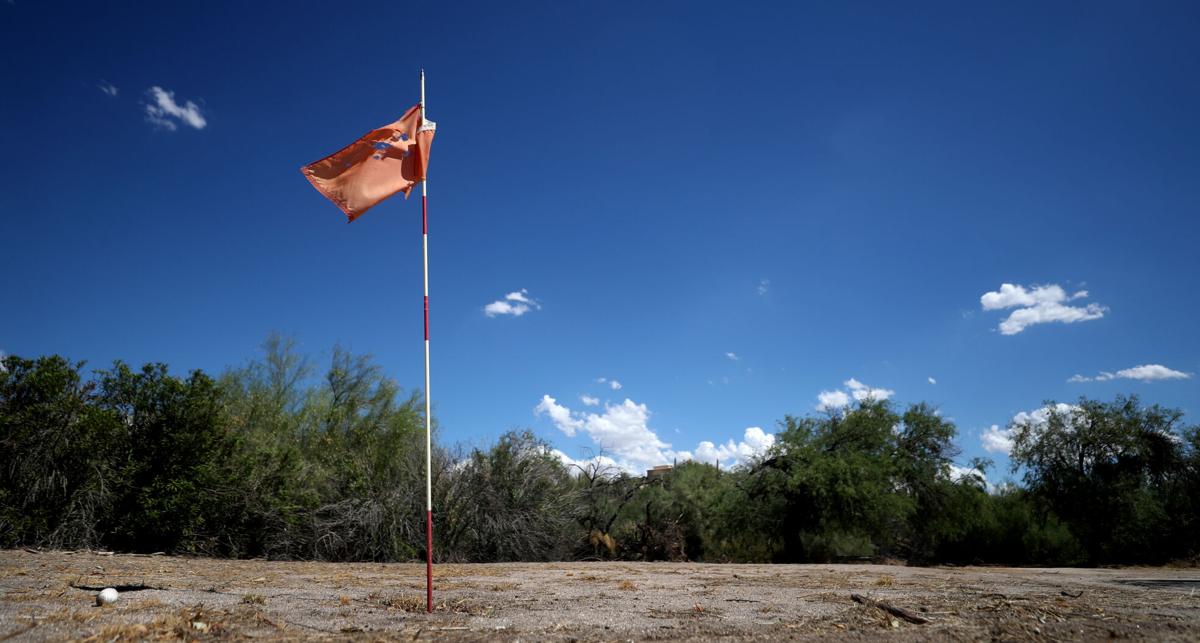The Pima County Board of Supervisors on Tuesday approved a controversial rezoning request for a new housing development on an abandoned golf course north of Tucson, despite more than a year of opposition from neighbors.
A California-based developer plans to build 310 housing units at the former Quail Canyon Golf Course across about 53 acres of land near the southeast corner of North Oracle and West Rudasill roads. Supervisors voted 4-1, with Supervisor Adelita Grijalva dissenting, to approve the developer’s rezoning request that allows for more housing in the region than currently allowed.
The plan proposes 210 apartment units across seven, three-story buildings in the northern portion of the site and 100 single-family homes in the southern portion. Pima Wash would separate the two sections of the development.
Neighbors have spoken out against the development, many of them organizing under a group called “Save Pima Wash,” over concerns about flooding, the loss of riparian habitat, the project’s density and congestion on the nearby Rudasill Road.
The development is in Pima County Supervisor Rex Scott’s District 1, and until Tuesday, he hadn’t revealed if he planned to support the project. After a lengthy statement preceding the vote, Scott showed his support for the development.
The supervisor said the project “represents appropriate infill development,” and the developer’s commitment to water conservation efforts, mitigating impacts to wildlife and paying for roadway improvements influenced his decision.
“I am grateful to the opponents of this project from the neighborhood for all of their thoughtful and sincere input. You demonstrated during a fraught and bitter time in our political history how public discourse can be respectful, intelligent and dignified,” Scott said. “ My commitment is to continue to engage with you moving forward with regard to all of your concerns and ideas, not just with this project, but also with Rudasill Road.”
Supervisor Grijalva said the area “is the wrong place for a high-density housing project,” and echoed concerns from speakers about environmental impacts.
Supervisor Sharon Bronson said, “This is the right place and the right time and the right project” and while she understands “the neighbors’ concerns … I think they’ve been addressed and moving forward, I think the staff and the developer will continue to work with the neighbors.”
Supervisor Matt Heinz has expressed support for the increased housing the project will provide, and Supervisor Steve Christy did not explain his vote at the meeting.
An hours-long public hearing on the development before the supervisors’ vote saw many speakers and stakeholders living around the proposed development speak out against it. Still, several other speakers supported the plan for providing much-needed housing in the area through infill development, a notion the developer has pushed as a core argument for the project’s approval.
“This is the right project for this infill site, and it is going to play a small part, but it will play a part in adding housing to our region that is so desperately needed,” Rory Juneman, who’s representing the developer, Urbaneer Investment Partners, through the local law firm Lazarus & Silvyn.
The developer has said the project would leave the Pima Wash as natural open space, except for a bridge crossing, and add bank protections. But neighbors worry the development would negatively impact the wildlife and native vegetation along the wash and that flooding would inevitably degrade the development.
“We have seen how often the 100-year and 200-year floods happen nowadays, a lot more often than every 100 years. Natural riparian areas will recover from floods. 300 homes won’t,” said Joan Scott, one speaker against the development.
The development “will meet or exceed our floodplain management requirements,” Eric Shepp, assistant director of the county’s flood control district, told the board.
If one less supervisor voted for the rezoning, it wouldn’t have passed. The pushback triggered a requirement for a super-majority vote with at least 4 supervisors approving rezoning the area to allow for the development to proceed.
About 33% of property owners within 300 feet of the area representing 44% of ownership within the rezoning site submitted written protests to the development, triggering a state law that calls for a super-majority vote if at least a 20% threshold is met for both of those figures.
Just one day before the vote, Lazarus & Silvyn sent the board a request for another special condition after working “extensively with the Coalition for Sonoran Desert Protection,” a July 10 letter from the firm says. The board accepted the request as part of its vote.
The request includes allowing one additional unit for every 4,000 square feet of open space preserved next to the Pima Wash in the southern portion of the preliminary development plan, totaling up to 120 units instead of the 100 single-family units in the current plan.
The letter also proposed making at least 40% of the northern parcel’s units one-bedroom or studio apartments, creating a construction management plan to mitigate impacts to surrounding properties and agreeing the owners will vote in support of an improvement district to fund upgrades of Rudasill road, if one is ever proposed.
Get your morning recap of today's local news and read the full stories here: http://tucne.ws/morning





